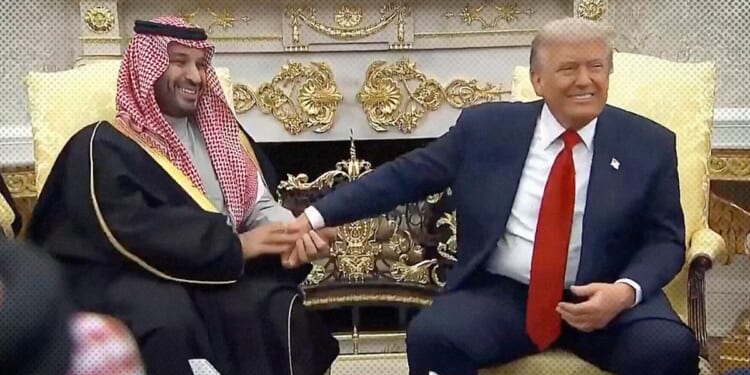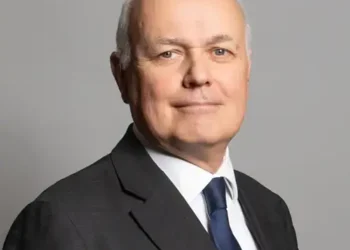Saudi Crown Prince Mohammed bin Salman received the royal treatment yesterday in his first visit to the White House since 2018. He was greeted at the South Portico with an Army honor guard of black horses bearing American and Saudi flags, and herald trumpeters, a flyover of six F-15 and F-35 fighter jets that streaked across the Washington sky, and the pomp continued with a grand dinner Tuesday evening. Trump certainly knows how to speak the language of strong men because he is one, which means presenting your power and prestige. Trump is also the master of making deals.
As our Nate Jackson pointed out, Trump’s “goal is to make deals, not democracy,” and he certainly seems well on his way to doing just that with the Saudis.
The Saudis had initially pledged to invest $600 billion in the United States, but yesterday, Trump got his friend, as he called him, to agree to more. Bin Salman made the vow in comments to the press: “Today and tomorrow, we are going to announce that we are going to increase that, that $600 billion to almost $1 trillion of investment, real investment and real opportunity in many areas.” In response to the Saudis’ promise, Trump has confirmed that he would be willing to sign off on the sale of F-35 stealth fighter jets to the kingdom. This could shift the balance of power in the Middle East, rivaling Israel, but bringing the Saudis back into the diplomatic fold, further alienating Iran. Trump designated Saudi Arabia a “Major Non-NATO Ally” on Tuesday, noting that the classification would take the country’s military cooperation with the United States “to even greater heights.”
Major Non-NATO Ally status is a designation that “provides foreign partners with certain benefits in the areas of defense trade and security cooperation,” according to the State Department. It does not, however, require U.S. security commitments to such countries. “You always had a little cloud over your head, and sometimes that cloud was very big,” Trump said before he announced the designation at a dinner honoring Crown Prince Mohammed. “That cloud is not there anymore, and we want to keep it that way.”
Trump is also hoping that normalizing relations with Saudi Arabia will lead the nation to join the Abraham Accords, which would go a long way toward stabilizing the region. That possibility seems unlikely since the kingdom has said that it would need some commitment from Israel to a path to a Palestinian state, which Israel has previously dismissed. However, Michael Wahid Hanna, the U.S. program director at the International Crisis Group, acknowledged the changes the Crown Prince has actualized in the country. “This hasn’t been political reform in the sense of creating space for real politics, but he’s absolutely, fundamentally reoriented Saudi society and changed the role of the religious authorities.” He added that Prince Mohammed is “central to what this administration wants to do in the region.”
Of course, the Prince’s visit was met with horror by Leftmedia outlets and reporters due to the brutal murder of journalist Jamal Khashoggi in 2018. ABC News asked the crown prince about the murder and about the criticisms from the families of the victims of the 9/11 terrorist attacks. He responded that criticisms of his government were part of a campaign to drive a wedge between Washington and Riyadh, adding, “I feel painful about, you know, families of 9/11 in America. But you know, we have to focus on reality.” He also defended the kingdom’s probe into the Khashoggi killing, which he noted included internal reforms. A Saudi court sentenced five people to death for their involvement in the murder.
Trump came to the prince’s defense, chiming in, “You’re mentioning somebody [Khashoggi] that was extremely controversial. A lot of people didn’t like that gentleman that you’re talking about. Whether you like him or didn’t like him, things happen, but [the crown prince] knew nothing about it, and we can leave it at that.” At the time of the event in 2018, Trump defended the Saudi government even though the CIA concluded that the crown prince had ordered the killing. I’m just going to point out that the CIA also “concluded” that Trump colluded with Russia to alter the elections in 2016 and that has decisively been exposed as a hoax. The prince in 2019 said that he took “full responsibility” because the murder happened on his watch, but that he did not order it. He promised in the meeting yesterday, “We are doing our best that this doesn’t happen again.”
The Washington Post, where Khashoggi worked, observes, “Saudi Arabia is eager to deepen defense cooperation with the United States, a critical prerequisite for the kingdom’s ambitious plans to diversify its economy.” Bin Salman has been attempting to cast himself as a peacemaker on the world stage to advance regional stability and boost his plans to transform the Saudi economy. Clearly, his role as one of the leaders who helped broker the ceasefire between Israel and Hamas has advanced that cause. He seems determined to open Saudi Arabia to the rest of the world, from the Saudi-backed LIV golf tournaments to the Ultimate Fighting Championship matches and comedy shows hosted there. The Post noted that he was so resolved that he even “sidelined powerful clerics in the country as he reversed a ban on female drivers and integrated more Saudi women into the workforce.”
Trump touted in his first visit back to the Middle East that “a new generation of leaders is transcending the ancient conflicts and tired divisions of the past, and forging a future where the Middle East is defined by commerce, not chaos; where it exports technology, not terrorism; and where people of different nations, religions, and creeds are building cities together, not bombing each other out of existence.”
Although I and many others have warned that Islam is not compatible with Western values, if the Crown Prince and other leaders in the region can keep their religious radical terrorists at bay and, at the very least, not fund them, Trump’s plan may have a chance to advance American interests in the region. Primarily, that means countering Iran and subduing Hamas. Sometimes, shaking hands with an unseemly foreign leader is the only way forward.

















